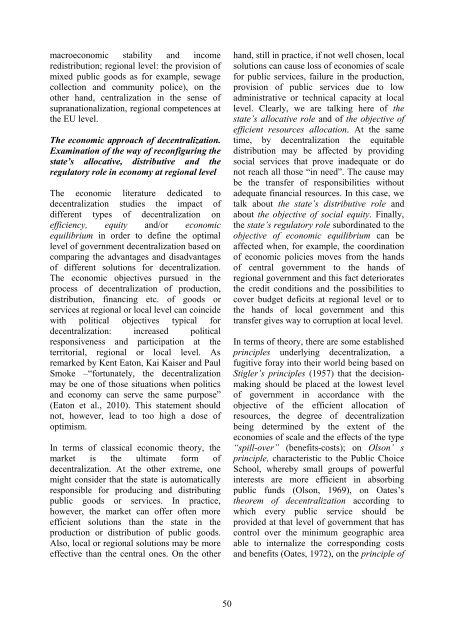Selected papers~ SPECIAL EDITION - Index of
Selected papers~ SPECIAL EDITION - Index of
Selected papers~ SPECIAL EDITION - Index of
Create successful ePaper yourself
Turn your PDF publications into a flip-book with our unique Google optimized e-Paper software.
macroeconomic stability and income<br />
redistribution; regional level: the provision <strong>of</strong><br />
mixed public goods as for example, sewage<br />
collection and community police), on the<br />
other hand, centralization in the sense <strong>of</strong><br />
supranationalization, regional competences at<br />
the EU level.<br />
The economic approach <strong>of</strong> decentralization.<br />
Examination <strong>of</strong> the way <strong>of</strong> reconfiguring the<br />
state’s allocative, distributive and the<br />
regulatory role in economy at regional level<br />
The economic literature dedicated to<br />
decentralization studies the impact <strong>of</strong><br />
different types <strong>of</strong> decentralization on<br />
efficiency, equity and/or economic<br />
equilibrium in order to define the optimal<br />
level <strong>of</strong> government decentralization based on<br />
comparing the advantages and disadvantages<br />
<strong>of</strong> different solutions for decentralization.<br />
The economic objectives pursued in the<br />
process <strong>of</strong> decentralization <strong>of</strong> production,<br />
distribution, financing etc. <strong>of</strong> goods or<br />
services at regional or local level can coincide<br />
with political objectives typical for<br />
decentralization: increased political<br />
responsiveness and participation at the<br />
territorial, regional or local level. As<br />
remarked by Kent Eaton, Kai Kaiser and Paul<br />
Smoke –“fortunately, the decentralization<br />
may be one <strong>of</strong> those situations when politics<br />
and economy can serve the same purpose”<br />
(Eaton et al., 2010). This statement should<br />
not, however, lead to too high a dose <strong>of</strong><br />
optimism.<br />
In terms <strong>of</strong> classical economic theory, the<br />
market is the ultimate form <strong>of</strong><br />
decentralization. At the other extreme, one<br />
might consider that the state is automatically<br />
responsible for producing and distributing<br />
public goods or services. In practice,<br />
however, the market can <strong>of</strong>fer <strong>of</strong>ten more<br />
efficient solutions than the state in the<br />
production or distribution <strong>of</strong> public goods.<br />
Also, local or regional solutions may be more<br />
effective than the central ones. On the other<br />
50<br />
hand, still in practice, if not well chosen, local<br />
solutions can cause loss <strong>of</strong> economies <strong>of</strong> scale<br />
for public services, failure in the production,<br />
provision <strong>of</strong> public services due to low<br />
administrative or technical capacity at local<br />
level. Clearly, we are talking here <strong>of</strong> the<br />
state’s allocative role and <strong>of</strong> the objective <strong>of</strong><br />
efficient resources allocation. At the same<br />
time, by decentralization the equitable<br />
distribution may be affected by providing<br />
social services that prove inadequate or do<br />
not reach all those “in need”. The cause may<br />
be the transfer <strong>of</strong> responsibilities without<br />
adequate financial resources. In this case, we<br />
talk about the state’s distributive role and<br />
about the objective <strong>of</strong> social equity. Finally,<br />
the state’s regulatory role subordinated to the<br />
objective <strong>of</strong> economic equilibrium can be<br />
affected when, for example, the coordination<br />
<strong>of</strong> economic policies moves from the hands<br />
<strong>of</strong> central government to the hands <strong>of</strong><br />
regional government and this fact deteriorates<br />
the credit conditions and the possibilities to<br />
cover budget deficits at regional level or to<br />
the hands <strong>of</strong> local government and this<br />
transfer gives way to corruption at local level.<br />
In terms <strong>of</strong> theory, there are some established<br />
principles underlying decentralization, a<br />
fugitive foray into their world being based on<br />
Stigler’s principles (1957) that the decisionmaking<br />
should be placed at the lowest level<br />
<strong>of</strong> government in accordance with the<br />
objective <strong>of</strong> the efficient allocation <strong>of</strong><br />
resources, the degree <strong>of</strong> decentralization<br />
being determined by the extent <strong>of</strong> the<br />
economies <strong>of</strong> scale and the effects <strong>of</strong> the type<br />
“spill-over” (benefits-costs); on Olson’ s<br />
principle, characteristic to the Public Choice<br />
School, whereby small groups <strong>of</strong> powerful<br />
interests are more efficient in absorbing<br />
public funds (Olson, 1969), on Oates’s<br />
theorem <strong>of</strong> decentralization according to<br />
which every public service should be<br />
provided at that level <strong>of</strong> government that has<br />
control over the minimum geographic area<br />
able to internalize the corresponding costs<br />
and benefits (Oates, 1972), on the principle <strong>of</strong>


